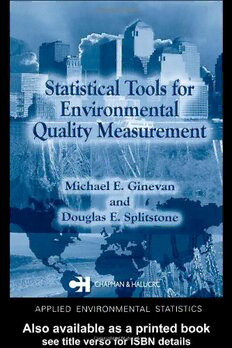
Statistical Tools for Environmental Quality Measurement PDF
238 Pages·2003·5.907 MB·English
Most books are stored in the elastic cloud where traffic is expensive. For this reason, we have a limit on daily download.
Preview Statistical Tools for Environmental Quality Measurement
Description:
When interpreting environmental data, scientists and engineers first must select the correct statistical tool to use for their analysis. By doing this they will be able to make sound decisions in their efforts to solve environmental problems. They need a detailed reference that points out the subtle differences between statistical procedures, making clear what procedure to use when trying to find the answer to a specific problem.Statistical Tools for Environmental Quality Measurement provides a detailed review of statistical tools used in analyzing and addressing environmental issues. This book examines commonly-used techniques found in USEPA guidelines and discusses their potential impact on decision-making. The authors are not constrained by statistical formalism; they advise when to go outside of standard statistical models when making difficult decisions. The content is presented in a practical style that prioritizes methods that work, based upon the authors' extensive experience.The text points out that simplicity facilitates effective communication of an analysis and decision to a ''consumer'' of statistics. The book emphasizes the exact question that each procedure addresses, so that environmental scientists and engineers can clearly identify precisely the question they want to ask, and correctly interpret the results. Features
See more
The list of books you might like
Most books are stored in the elastic cloud where traffic is expensive. For this reason, we have a limit on daily download.
